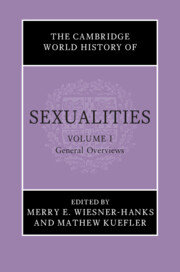Book contents
- The Cambridge World History of Sexualities
- The Cambridge World History of Sexualities
- The Cambridge World History of Sexualities
- Copyright page
- Contents
- Figures in Volume I
- Contributors to Volume I
- Editors’ Preface to the Series
- 1 The History of the History of Sexuality
- 2 The History of Sexuality and Anthropology
- 3 The History of Sexuality and Women’s History
- 4 The History of Sexuality and LGBTQ+ History
- 5 The Impact of Sigmund Freud on the History of Sexuality
- 6 Michel Foucault’s Influence on the History of Sexuality
- 7 Queer Theory and the History of Sexuality
- 8 The Sexual Body in History
- 9 Marriage and Families in the History of Sexuality
- 10 Class in the History of Sexuality
- 11 Sexuality and Race: Representations, Regulations, and Sentiments
- 12 Male Homoerotic Relations in History
- 13 Desire, Love, and Sex between Women in Global History
- 14 Trans and Gender Variant Sexualities in History
- 15 The Sale of Sex in History
- 16 Sexual Violence in History
- 17 Sexual Science in History
- 18 Sexuality and Emotion
- 19 Erotic Art in World History
- 20 Erotic Literature in History
- 21 The Material Culture of the History of Sexuality
- 22 Public History and Sexuality
- Index
- CONTENTS TO VOLUMES II, III, AND IV
- References
15 - The Sale of Sex in History
Published online by Cambridge University Press: 26 April 2024
- The Cambridge World History of Sexualities
- The Cambridge World History of Sexualities
- The Cambridge World History of Sexualities
- Copyright page
- Contents
- Figures in Volume I
- Contributors to Volume I
- Editors’ Preface to the Series
- 1 The History of the History of Sexuality
- 2 The History of Sexuality and Anthropology
- 3 The History of Sexuality and Women’s History
- 4 The History of Sexuality and LGBTQ+ History
- 5 The Impact of Sigmund Freud on the History of Sexuality
- 6 Michel Foucault’s Influence on the History of Sexuality
- 7 Queer Theory and the History of Sexuality
- 8 The Sexual Body in History
- 9 Marriage and Families in the History of Sexuality
- 10 Class in the History of Sexuality
- 11 Sexuality and Race: Representations, Regulations, and Sentiments
- 12 Male Homoerotic Relations in History
- 13 Desire, Love, and Sex between Women in Global History
- 14 Trans and Gender Variant Sexualities in History
- 15 The Sale of Sex in History
- 16 Sexual Violence in History
- 17 Sexual Science in History
- 18 Sexuality and Emotion
- 19 Erotic Art in World History
- 20 Erotic Literature in History
- 21 The Material Culture of the History of Sexuality
- 22 Public History and Sexuality
- Index
- CONTENTS TO VOLUMES II, III, AND IV
- References
Summary
This chapter provides a thematic overview of commercial sex across time and space. Each section seeks to identify continuities and shifts in the way people debated, policed, and practiced commercial sex. While the analysis focuses primarily on the modern period, the chapter starts in antiquity to discuss the gendered and hierarchical notions that different societies and groups have used to refer to the ‘flesh trade’. A second section deals with the regimes and actors that have sought to control, repress, regulate, or decriminalise/normalise the sale of sex at the local, national, and international levels. Where possible, the voices of women and men who traded physical sex for money or other benefits are included in the analysis. The bottom-up approach is further developed in sections three and four, which focus on the structure and working conditions of the sex trade and profile the sellers of sex, intermediaries, and clients. A concluding section reflects on stigma, an issue that seems to have remained constant in the long history of (female) prostitution, and on coercion and consent, concepts that can be regarded as typically modern.
- Type
- Chapter
- Information
- The Cambridge World History of Sexualities , pp. 315 - 338Publisher: Cambridge University PressPrint publication year: 2024



